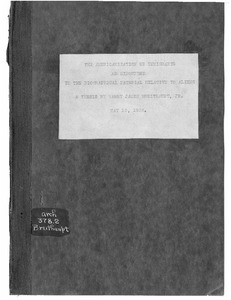| dc.rights.license | In Copyright | en_US |
| dc.creator | Breithaupt, Harry James, Jr. | |
| dc.date.accessioned | 2023-04-21T19:30:25Z | |
| dc.date.available | 2023-04-21T19:30:25Z | |
| dc.date.created | 1936 | |
| dc.identifier | WLURG038_Breithaupt_thesis_1936 | |
| dc.identifier.uri | https://dspace.wlu.edu/handle/11021/36173 | |
| dc.description | The title page of this thesis indicates that it was submitted "in partial fulfillment of the requirements for the degree of Master of Arts." | en_US |
| dc.description.abstract | Manifold are the reasons for the exodus of people from their native lands to emigrate to America. Many have come because of political suppression, many because of financial difficulties, many because of racial differences, many because of religious opposition, many for countless other reasons, perhaps not nearly so well-defined -- but all have come with quickened step and expectant air, eagerly awaiting the anticipated wonders. . . . Most immigrants find the task of Americanization not impossible, but by no means easy. Whatever the circumstances may have been, there has existed, in every instance, a certain degree of "culture conflict", in a sociological connotation. The implication is certainly not of physical conflict, nor is it of mental conflict. It is simply the contact of two or more different cultures, or of various phases of those cultures. One is not to infer that culture conflict depends upon the open meeting of two culture patterns widely separated in terms of physical distance, either, for a city block may easily suffice to mark the boundary line between two widely varied cultures, as an ecological study of any city will illustrate. It is with certain phases of this culture conflict that we are to deal. We are, however, to broaden the term so that it shall include constructive conflict as well as destructive conflict. We shall study the culture conflict as it has progressed between American civilization on the one hand, and the folkways and mores of certain aliens, on the other. We shall include certain influences upon the American culture which were exerted by various aliens; and we shall also look at the changes wrought upon individual aliens by the effects of American culture. A broad subject, you say; one which is inexhaustible. How are we to limit it? We do so by confining the study to representative biographies of these immigrants and aliens. Particularly shall the study be limited, under the heading of "alien-biography", to two general types of biography. First, and most important from the standpoint both of value, and of interest, is the self-biography, the autobiography of the alien or the immigrant. The second type to be studied is the so-called "new" biography, the psychological biography. [From Introduction] | en_US |
| dc.format.extent | 142 pages | en_US |
| dc.language.iso | en_US | en_US |
| dc.rights | This material is made available for use in research, teaching, and private study, pursuant to U.S. Copyright law. The user assumes full responsibility for any use of the materials, including but not limited to, infringement of copyright and publication rights of reproduced materials. Any materials used should be fully credited with the source. | en_US |
| dc.rights.uri | http://rightsstatements.org/vocab/InC/1.0/ | en_US |
| dc.title | The Americanization of Immigrants as Expounded in the Biographical Material Relative to Aliens | |
| dc.type | Text | en_US |
| dcterms.isPartOf | WLURG38 - Student Papers | |
| dc.rights.holder | Breithaupt, Harry James, Jr. | |
| dc.subject.fast | Americanization | en_US |
| dc.subject.fast | Immigrants -- United States | en_US |
| local.department | English | en_US |
| local.scholarshiptype | Master of Arts | en_US |
